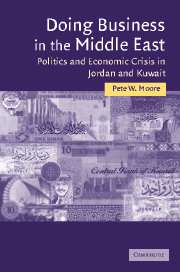Book contents
- Frontmatter
- Contents
- Acknowledgements
- Note on transliteration and translation
- 1 Summers of discontent: business–state politics in the Middle East
- 2 Organizing first: business and political authority during state formation
- 3 Politics and profits
- 4 Crises at century's end
- 5 Is business the solution?
- Appendix Comparative associational data
- Select bibliography
- Index
- Cambridge Middle East Studies 19
3 - Politics and profits
Published online by Cambridge University Press: 22 September 2009
- Frontmatter
- Contents
- Acknowledgements
- Note on transliteration and translation
- 1 Summers of discontent: business–state politics in the Middle East
- 2 Organizing first: business and political authority during state formation
- 3 Politics and profits
- 4 Crises at century's end
- 5 Is business the solution?
- Appendix Comparative associational data
- Select bibliography
- Index
- Cambridge Middle East Studies 19
Summary
Good times in Kuwait
The 1970s rise in oil prices generated an unprecedented economic boom in Kuwait and throughout the Middle East. From 1960 to 1985, Middle East and North African countries outperformed all other regions in the developing world in terms of income growth and distribution. The implications for business–state relations were equally profound. On the one hand, increased state investment in shareholding companies and the general increase in domestic demand significantly enriched merchant elites. Whereas the KCCI elite was already comparatively wealthy within their own country, the boom of the 1970s made them rich regionally and internationally. On the other hand, the monumental increase in state autonomy and distributional resources reduced the KCCI's policy leverage while increasing the leverage and profile of new business elements. By the mid-1970s, state officials and the monarchy ignored most KCCI attempts at policy input and altered distributional policies to enrich rivals to the traditional elite, thus building a wider network of supporters. The economic effect of these policies was creation of a fragile fiscal system that by 1982 was on the verge of collapse.
While Kuwait reaped oil riches in the 1960s, the boom of the 1970s was massive by comparison. In the latter half of the 1960s oil revenue to the state averaged about KD 270 million annually. In 1974, oil revenue had increased to over KD 2 billion. The 1973 war and ensuing OPEC interventions helped keep oil prices high throughout the decade.
- Type
- Chapter
- Information
- Doing Business in the Middle EastPolitics and Economic Crisis in Jordan and Kuwait, pp. 85 - 119Publisher: Cambridge University PressPrint publication year: 2004

